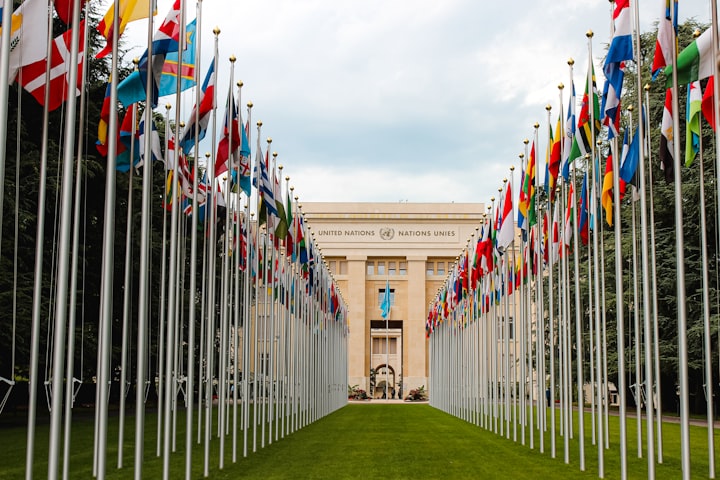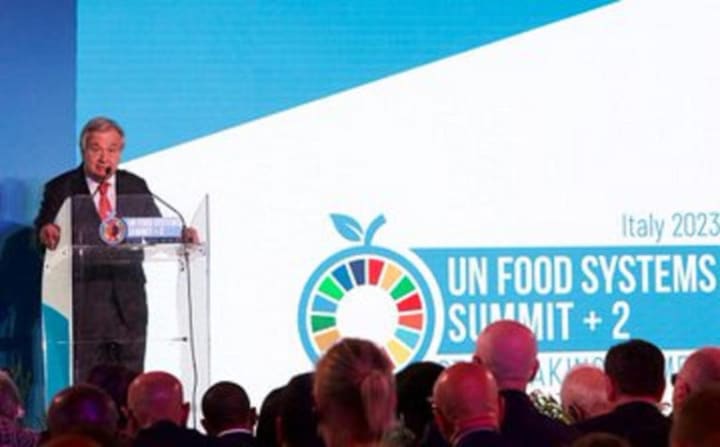

Addis Ababa, July 25/2023 (ENA), UN Secretary-General António Guterres stressed the need to end global hunger, promote business-government cooperation, and mitigate the effects of climate change on food production.
At the UN Food Systems Summit +2 Stocktaking Moment in Rome, Italy, the Secretary-General said it.
Ethiopian Prime Minister Abiy Ahmed is among 20 Heads of State and Government at the Summit.
“It is outrageous that people continue to suffer and die from hunger,” Guterres said.
“Billions are suffering from broken global food systems.”
According to UN estimates, over 780 million people are hungry, almost one-third of global food production is wasted, and nearly three billion people cannot afford healthy diets.
Limited resources and debt prevent developing countries from investing fully in food systems that produce nutritious food for all.
Unsustainable food production, packaging, and consumption account for 30% of greenhouse gas (GHG) emissions, 70% of freshwater usage, and biodiversity loss.
Starting with "massive" investment in sustainable food systems, the UN chief outlined three key areas for action.
The UN chief stressed the need to end global hunger, promote business-government cooperation, and mitigate the effects of climate change on food production.
“Starving food systems of investment means, quite literally, starving people,” he said, urging governments to support the UN's SDG Stimulus of at least 500 billion USD annually to support long-term financing for all needy countries.
Guterres urged governments and businesses to "put people over profit" when building food systems.
At the opening, Qu Dongyu, Director-General of the UN Food and Agriculture Organization (FAO), stressed the importance of assessing agrifood system transformation progress toward the 17 SDGs, agreed upon by all nations in 2015.
He noted the progress in identifying agrifood system solutions for better production, nutrition, the environment, and life, such as sustainable farming, efficient water management, responsible packaging, reforestation, and reduced food waste.
Qu said these depended on improving global agrifood systems.
“In the face of increasing uncertainties and multiple crises, we need to urgently undertake this transformation to fulfil our high expectations from our agrifood systems,” he said.
The UN Food Systems Summit +2 Stocktaking Moment will gather over 2,000 people from 160 countries from July 24 to 26 to review progress on the 2021 Food Systems Summit's commitments and identify successes and bottlenecks while refocusing priorities.The Food Systems Summit two years ago illuminated a fundamental truth:
Billion people suffer from broken food systems.
780 million people are hungry and nearly one-third of food is wasted.
Over three billion cannot afford healthy diets.
Two billion are obese.
462 million underweight.
Without financing and debt relief, developing countries can't invest in food systems that provide everyone with healthy nutrition.
Unsustainable food production, packaging, and consumption generate one-third of greenhouse gas emissions, use 70% of freshwater, and cause massive biodiversity loss.
Many communities are one shock from famine.
The Russian Federation's termination of the Black Sea Initiative, which allowed the safe export of 32 million metric tons of food on 1,000 vessels from Ukrainian ports, has worsened the situation.
The Initiative and our Memorandum of Understanding with Russia to facilitate food and fertilizer exports have saved global food security and price stability.
Food prices fell 23% last year.
The Black Sea Initiative's end will hurt the weakest.
Everyone pays higher food prices.
Global wheat and corn prices are falling, hurting everyone.
This is especially devastating for vulnerable countries struggling to feed their people.
Developing nations lose hope as food prices rise.
Food security depends on Russia and Ukraine.
They exported 30% of global wheat and barley, 20% of maize, and over half of sunflower oil.
I will continue to help Ukraine and the Russian Federation access global markets for food and fertilizers and provide everyone with food security.
My latest proposal urges the Russian Federation to resume Black Sea Initiative implementation.
I urge the world to unite for effective solutions in this vital effort.
Dear friends,
Food systems can recover.
We chose them.
Food is abundant worldwide.
Plenty of money to feed the world with efficient, sustainable food systems and decent wages for farmers.
And plenty of agricultural innovations and technology to make healthy food accessible to everyone.
The good news is that countries are heeding our 2021 Food Systems Summit warning.
Over 100 countries have voluntarily reported food system transformation progress.
Countries are making laws, policies, and programming reflect this priority.
More data shapes policies, programs, and investments.
Through the UN Food Systems Coordination Hub, governments, businesses, civil society, and UN agencies are partnering more.
But saving the SDGs requires more.
Time's up.
Three areas require immediate action.
First, massive food system investment.
Western Asia, the Caribbean, and all of Africa have the weakest and least-funded food systems, so chronic hunger is rising there.
Two weeks ago, the State of Food Security and Nutrition report found that one in five Africans are hungry—more than twice the global average.
Food system underinvestment starves people.
I urge governments to implement an SDG Stimulus to increase affordable long-term financing for all needy countries by at least 500 billion dollars a year.
This will help countries achieve Sustainable Development Goal 2 to end hunger and build systems to provide affordable, nutritious food to everyone.
We also need more investments in adaptation and shock-resistant food, health, water, sanitation, and agriculture systems and early warning systems.
I also urge governments to support the Global Crisis Response Group on Food, Energy, and Finance's Food Import Facility for at least 50 acutely food-insecure countries and a Food Stockholding Mechanism for least-developed countries.
Second, governments and businesses must collaborate to create people-first systems.
I urge governments and the food, agricultural, transportation, and retail industries to find new ways to lower the cost and expand the availability of fresh, healthy food for all.
Keep food markets open and remove trade barriers and export restrictions.
Science and technology can improve food systems' efficiency and reach.
Farmers, food workers, and transporters must also be supported.
The World Bank estimates food systems make up 10% of the global economy.
We must keep helping the people who make this prosperity possible.
Thirdly, we need food systems to end our planet's inhumane war.
To limit global warming to 1.5 degrees Celsius, food systems must be transformed.
To reduce the carbon footprint of food processing, packaging, and transport, new sustainable systems must be implemented.
Use new technologies to reduce non-sustainable land, water, and resource use in food production and agriculture.
States and companies must take stronger and faster measures to fight the climate crisis and meet environmental justice expectations.
Finally, all nations must commit to zero net emissions by 2040 for developed nations and 2050 for developing nations.
Food and transportation systems must contribute to this global effort.
Ladies and gentlemen,
Food system change requires teamwork.
You've collaborated from the start.
National dialogues between governments, businesses, communities, and civil society to find solutions.
To the creation of the UN Food Systems Coordination Hub to end fragmentation and speed progress.
To the 155 national convenors leading country transformation.
To our leaders and everyone in this room and online.
Let's persist in change.
Keep learning and holding each other accountable.
Let's transform food systems to give everyone in every community and country safe and nutritious food.
Let's not forget that developing countries need massive debt relief and long-term investments to achieve these goals and overcome their asphixy.
About the Creator
Wayne
Am wayne, a writer from kenya specified in research and article writing. I love doing research on natural things, football updates and updating what going on in the world





Comments
There are no comments for this story
Be the first to respond and start the conversation.